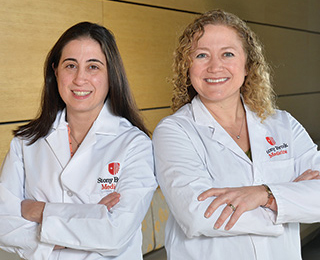OFFERING NEW NONSURGICAL "GASTRIC BALLOON" WEIGHT LOSS TREATMENT
First to Provide the Orbera Procedure in Suffolk County

| Dr. Aurora Pryor (right), Director, Bariatric and Metabolic Weight Loss Center, and Chief, Bariatric, Foregut, and Advanced Gastrointestinal Surgery, and Dr. Dana Telem, Associate Director, Bariatric and Metaboloic Weight Loss Center. |
STONY BROOK, NY, March 2, 2016 — Our bariatric specialists at the Stony Brook Bariatric and Metabolic Weight Loss Center have expanded their endoscopic arsenal in the fight against obesity with the new nonsurgical procedure called Orbera.
FDA approved in mid 2015 after 20 years of successful use internationally, Orbera combines a gastric balloon that encourages portion control with a 12-month customized weight loss plan and expert support team.
The deflated silicone balloon is placed in the patient's stomach endoscopically — which means no incision, no downtime, and minimal risk — and it’s then filled with saline solution. The procedure is done on an outpatient basis in just 20 to 30 minutes using mild sedation.
"The balloon makes portion control easier," says Aurora D. Pryor, MD, director of the Bariatric and Metabolic Weight Loss Center, and chief of our Bariatric, Foregut, and Advanced Gastrointestinal Surgery Division. "There are no incisions and no downtime, and it is associated with minimal risk."
How It Works. The balloon helps the patient eat less by taking up space in the stomach. Losing weight and keeping it off, however, demand lifestyle changes. So the Orbera program also requires a 12-month commitment to diet and exercise supported by our team of bariatric specialists, who are experts in medical management, nutrition, and exercise.

Six months after the balloon is placed, it is removed — but the lifestyle coaching continues.
Our support team works with each patient for another half year to retrain their appetite, maintain new eating habits, and continue their exercise routine.
The Orbera technology can support weight loss in the 30 to 50 pound range …
Now there's no need to leave Suffolk to have the procedure done.
"With a year of practice, patients establish healthy lifestyle choices that help them keep the weight off," says Dana A. Telem, MD, associate director of the Bariatric and Metabolic weight Loss Center. "Comprehensive, individualized support is part of our surgical and nonsurgical weight loss options."

Patients with gastric balloons also enjoy a 12-month customized diet and exercise program coached by our multidisciplinary team of weight loss experts.
Clinical Testing Results. After six months with the Orbera program, people lost more than three times the weight of those who followed diet and exercise alone.
Learn More. To receive Orbera, patients must meet requirements for body mass index (BMI) of 30 to 40 (= obesity) and medical eligibility. They also must commit to participating in the full 12-month program. Orbera currently is not covered by insurance.
Stony Brook's success is reflected in its outcomes data — among the top programs nationally — and in its accreditation from the Metabolic and Bariatric Surgery Accreditation and Quality Improvement Program.
"We're accredited at the highest level and for the broadest age range, from adolescents to adults," says Dr. Pryor.
Our bariatric specialists are committed to advancing both surgical and nonsurgical methods of weight loss treatment, and are actively involved in clinical trials of other novel devices for weight loss procedures, offering eligible patients exclusive access to them. Interested people can schedule an appointment with our surgeons to learn more.
A national leader, Dr. Pryor was the first in Suffolk for balloon placements, as she has been involved in a clinical trial with another balloon device since May of last year.
| During the clinical study submitted for FDA approval of the device, the group of people who used the Orbera intragastric balloon lost more weight than those who did not. Patients with Orbera lost an average of 21.8 pounds (10.2% of their body weight) after the device had been in place for six months. Three months after the device was removed (nine months after device placement), patients who received the device maintained an average of 19.4 pounds weight loss. More from FDA. |

